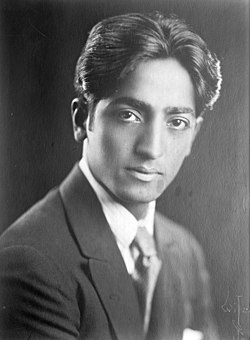Jiddu Krishnamurti Quote
But what is the point of education at all? Is it merely to cultivate the capacity of memory, passing examinations and getting a job and all the rest, or is education something entirely different? Something more!
Jiddu Krishnamurti
But what is the point of education at all? Is it merely to cultivate the capacity of memory, passing examinations and getting a job and all the rest, or is education something entirely different? Something more!
Tags:
education
Related Quotes
About Jiddu Krishnamurti
Jiddu Krishnamurti ( JID-oo KRISH-nə-MOOR-tee; 11 May 1895 – 17 February 1986) was an Indian spiritual speaker and writer. Adopted by members of the Theosophical tradition as a child because of his aura as perceived by Theosophic leader Charles Leadbetter, "without a particle of selfishness in it," he was raised to fill the advanced role of World Teacher, but in adulthood he rejected this mantle and distanced himself from the related religious movement. He nevertheless spent the rest of his life speaking to groups and individuals around the world to set mankind free, gaining a wider recognition in the 1950s, after Aldous Huxley had introduced him to his mainstream publisher and the publication of The First and Last Freedom (1954). Many of his talks have been published since, and he also wrote a few books himself, among them Commentaries on Living (1956–60) and Krishnamurti's Notebook (written 1961-62). His last public talk was in January 1986, a month before his death at his home in Ojai, California.
According to Krishnamurti an "immense energy and intelligence went through this body," a consciousness he called "the otherness" and which had always been there, but became more clear over time, as did his intellectual capability to express it in words. During his life he tried to share this experience in 'the teachings', but a few days before his death he stated that nobody had understood what his body went through, and after his death, this consciousness would be gone, and no other body would support it "for many hundred years."
Krishnamurti asserted that "truth is a pathless land" and advised against following any doctrine, discipline, teacher, guru, or authority, including himself. He dismissed the need for contrived meditation techniques, instead emphasizing the practice of choiceless awareness as the essence of "true meditation". He also emphasized psychological inquiry and liberation from cultural conditioning.
His supporters — working through non-profit foundations in India, Britain, and the United States — oversee several independent schools based on his views on education, and continue to distribute his thousands of talks, group and individual discussions, and writings in a variety of media formats and languages.
According to Krishnamurti an "immense energy and intelligence went through this body," a consciousness he called "the otherness" and which had always been there, but became more clear over time, as did his intellectual capability to express it in words. During his life he tried to share this experience in 'the teachings', but a few days before his death he stated that nobody had understood what his body went through, and after his death, this consciousness would be gone, and no other body would support it "for many hundred years."
Krishnamurti asserted that "truth is a pathless land" and advised against following any doctrine, discipline, teacher, guru, or authority, including himself. He dismissed the need for contrived meditation techniques, instead emphasizing the practice of choiceless awareness as the essence of "true meditation". He also emphasized psychological inquiry and liberation from cultural conditioning.
His supporters — working through non-profit foundations in India, Britain, and the United States — oversee several independent schools based on his views on education, and continue to distribute his thousands of talks, group and individual discussions, and writings in a variety of media formats and languages.
